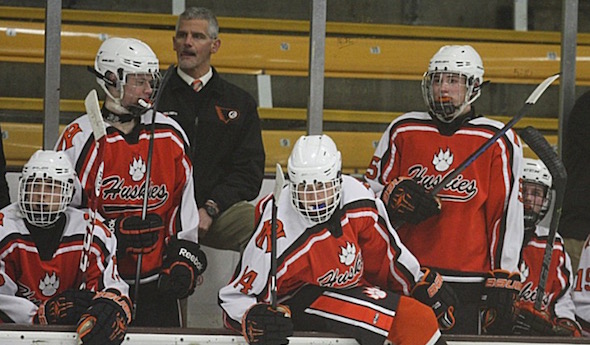
Veteran Coach, Huskies Eye Comeback
By
Pam Shebest
Special for MHSAA.com
December 21, 2015
PORTAGE — Although his hockey team skidded to the worst start during his 30-year coaching career, JD Kalleward and his Portage Northern Huskies still have that positive vibe going.
 “We don’t want to keep losing,” senior co-captain Jack Budnick said last week after the team opened 0-7. “We want to turn it around as soon as we can.
“We don’t want to keep losing,” senior co-captain Jack Budnick said last week after the team opened 0-7. “We want to turn it around as soon as we can.
“We’ve had a lot of close games where it’s just come down to a couple mistakes, and we’re working on them in practice.”
Portage Northern closed the 2015 portion of this season's schedule with its first win, 4-2 over Manistee on Friday, to move to 1-8 heading into the new year. And Kalleward is one reason the players are staying positive and focused, said senior co-captain Austin Killman.
“He’s been very vehement about hockey,” Killman said. “If he sees anybody slacking in practice, he’ll get them going.
“He’s been around the game for so long that he knows a lot about hockey and what systems will work in different situations. I have a lot of faith in his style.”
Kalleward said he honed his coaching style while working as an assistant to Art Missias, who passed away from cancer in 2010.
A netminder, Kalleward graduated from Northern in 1980. During his high school years, he helped coach goalies for his uncle, John Kalleward, Sr., and Missias with their squirt and peewee house teams.
It didn’t take long for JD to catch the coaching bug.


 When Missias took over the head coaching job at Portage Northern 30 years ago, he tapped JD Kalleward to be his assistant. Thirteen years ago when Missias retired, Kalleward took his mentor’s place.
When Missias took over the head coaching job at Portage Northern 30 years ago, he tapped JD Kalleward to be his assistant. Thirteen years ago when Missias retired, Kalleward took his mentor’s place.
One of the lessons learned from Missias is helping Kalleward deal with his team’s record so far this year: “You may have a down game, but it’s just one game.
“You’ve got to move on, learn from your mistakes and take the positives from it. Try and hope in the next game you do better.”
After losing nine seniors to graduation from a team that went 18-9-0 overall, 8-2 in the Southwest Michigan High School Hockey League last season, Kalleward knew this would be a rebuilding season. But he didn’t expect such a challenging start, including 0-2 in the league.
“Six of our (first) seven games have been on the road against very good programs including Traverse City, Forest Hills, East Kentwood, so we’ve had some pretty stiff competition,” Kalleward said.
Besides Budnick and Killman, the Huskies have just two other seniors: forward Scott Verduzco and goalie Tim Fitzgerald.
Scoring other successes
Although the Huskies have struggled early on the ice, Kalleward is most proud of their academic performance.
In his 13 years as head coach, his team has earned academic all-state every season.
“The last two years we were the top academic team out of 160 hockey teams in Michigan,” he said. “Two years ago, our team’s (grade-point average) was 3.94. Last year, it was 3.96
‘We have a number of kids who are academically gifted. Of the nine who graduated last year, we had just one beneath a 3.0; the other eight were above 3.5.”
Last season, Joe Mancina, with a 4.65 GPA, became the Huskies’ third top state scholar athlete in the last six years, as measured by grade-point average.
 One main reason Kalleward stresses academics is, “quite frankly, there aren’t too many who are going to sign NHL contracts,” he said. “We know that life after high school means doing well.
One main reason Kalleward stresses academics is, “quite frankly, there aren’t too many who are going to sign NHL contracts,” he said. “We know that life after high school means doing well.
“Every Thursday we meet with the players after practice to talk about where they are at school, their grades. We offer tutoring with those who are struggling.”
Over the last 30 years, Kalleward has seen several changes to both the game and the players.
“Relative to talent, you used to have a lot more kids going the route of playing high school,” he said. “Now they have so many options for players depending on what they want to do with their hockey careers.”
He also said players don’t seem as independent as they were in past years.
“What we find is sometimes it’s hard for kids to make their own decisions or make good decisions on their own,” he said. “As a coach, besides the X’s and O’s, we try to help them with that.”
As an assistant coach, Kalleward took note of what worked especially well and wrote a manual of expectations for coaches, parents and players that he distributes every season.
“We have an agreement signed by both parents and players saying they’ve read and understood the 16 points of emphasis, everything in the agreement: ice time, player behavior on the ice, behavior off the ice, academics, and so on,” he said.
Among team requirements are wearing khakis, a shirt and tie when going to games, “The same apparel they’d wear for a job interview,” he said.
“We eat together quite a bit and have rules on behavior. There’s probably a good three pages of rules.”
Turnaround time
Killman said it’s up to the captains to help turn the team around.
“You have to get your guys motivated for games, and if they’re getting down on themselves, try to get them back up,” he said. “If they’re coming to practice slacking, you’ve got to push them.
 “(Being captain) gives me more responsibility and I love responsibility.”
“(Being captain) gives me more responsibility and I love responsibility.”
Budnick said Killman is one spark on the team.
“Out on the ice before we go to opening faceoff, we gather around the net and we talk about the key aspects that we want to work on in the game,” Budnick said. “Austin is always taking the responsibility and says exactly what we need to do.
“Austin is definitely the hardest worker on the team, and that’s a great leadership quality from my perspective. It pushes everybody else.”
Kalleward’s three assistants include two Portage Northern alums. Steve Stanley, who works with the forwards, graduated in 1983, and Ken Rogers, who works with the defense, in 1975.
Tom Askey, who played pro hockey, including with the NHL Anaheim Mighty Ducks in 1997-98 and the then-United Hockey League Kalamazoo Wings in 2006-07, works with the goalies.
In 1975, the Huskies made it to the Tier II MHSAA Final before losing to Lansing Catholic Central. They made at least the Semifinals four times under Missias.
In spite of this year’s start, the future looks promising for the Huskies with four juniors, 10 sophomores and two freshmen mixing with the senior leaders.
Juniors are forwards Spencer Brown, Andrew Fitzgerald, Jesse Liebert and defenseman Calvin Voss.
Sophomores are forwards Grant Ernst, Mason Seiferlein, Tyler Simon; blueliners Griffin McLoed, Roarke Ross, Leon Fieber, Dakota Meadmore; two-way players Will Todd, Caleb Martin and goalie Zach Bossch.
The freshmen are forwards Zonjic Singleton-Julian and Connor Sorge.
Northern picks back up this season’s schedule Jan. 2 against Okemos.
 Pam Shebest served as a sportswriter at the Kalamazoo Gazette from 1985-2009 after 11 years part-time with the Gazette while teaching French and English at White Pigeon High School. She continues to freelance for MLive.com covering mainly Kalamazoo Wings hockey and can be reached at [email protected] with story ideas for Calhoun, Kalamazoo and Van Buren counties.
Pam Shebest served as a sportswriter at the Kalamazoo Gazette from 1985-2009 after 11 years part-time with the Gazette while teaching French and English at White Pigeon High School. She continues to freelance for MLive.com covering mainly Kalamazoo Wings hockey and can be reached at [email protected] with story ideas for Calhoun, Kalamazoo and Van Buren counties.
PHOTOS: (Top) Coach JD Kalleward has spent 30 seasons behind the Portage Northern bench. (Middle) Joe Mancina, center, was last season's top state academic athlete with a 4.65 GPA. He is joined by, from left, all-state team selection Mitchell Kalleward, former NHL player Mike Knuble, Northern all-stater Matty Seiferlien and Coach JD Kalleward. (Below) The Huskies' locker room door. (Head shots) From left: JD Kalleward, Jack Budnick and Austin Killman. (Top two photos courtesy of JD Kalleward; bottom photo and head shots by Pam Shebest.)
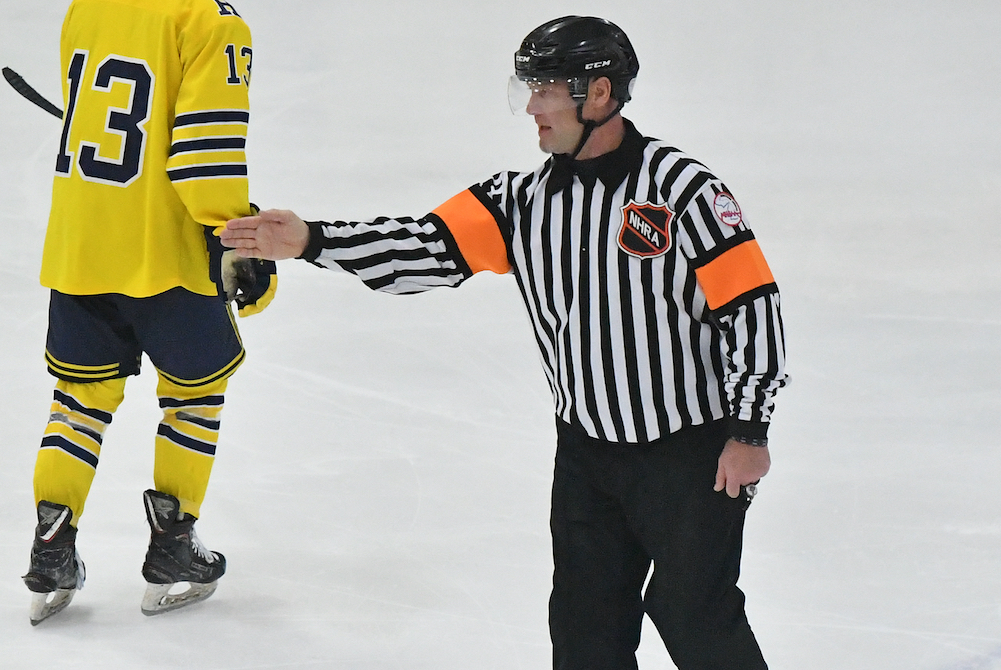
Retired NHL-er Back on Ice to Answer Call - By Making Them
By
Rob Kaminski
MHSAA benchmarks editor
March 16, 2023
The most accomplished skater on the ice during Friday’s triple-overtime MHSAA Division 1 Semifinal hockey thriller between Hartland and Brighton was not wearing the school colors of either team.
In front of a packed house at Plymouth’s USA Hockey Arena, referee Bryan Smolinski was in stripes, just like the rest of his officiating crew.
In his former life, he pulled on plenty of sweaters before lacing up the skates. That happens when one logs more than 1,000 games, tallies nearly 300 goals (274) and close to 400 assists (377) with eight teams spanning a 15-year playing career in the National Hockey League.
So, how did the 52-year-old former star player find himself on the ice last weekend as one of the referees for the pinnacle weekend of this high school season? Good question, even for the man known as “Smoke” during his playing days.
“I was working in youth development programs a few years back and reached out to some Michigan guys I had connections with about other ways to help the game,” Smolinski said. “I called Kevin May just to chat and asked, ‘Hey, how’s your reffing going?’ He said, ‘You know, we’re down a little bit,’ then said, ‘Why don’t you do it?’ I said, ‘Not a chance,’” Smolinski laughed.
Never Say Never
May persisted, imploring his friend to skate with him during a Fall league at Cranbrook in Bloomfield Hills. After eight weeks, once a week, Smolinski had a revelation.
“I’m like, ‘I’m kind of diggin’ this,’” Smolinski said “So, I did all the testing, and the educational part of it, and I really enjoyed it. I got with Danny (DiCristofaro) and his group, and he put me in as much as he could, and I really started to get my feet wet.”
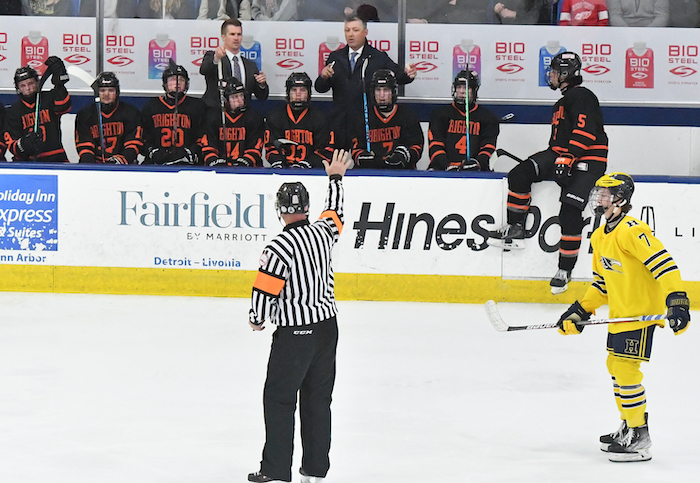 DiCristofaro is the assigner and referee-in-chief for the MHSAA’s Northeast Hockey Referees Association, and he has seen Smolinski’s growth first-hand.
DiCristofaro is the assigner and referee-in-chief for the MHSAA’s Northeast Hockey Referees Association, and he has seen Smolinski’s growth first-hand.
“Obviously he’s got great instincts and a feel for the game, along with a wealth of experience, all of which has allowed him to climb the ladder quickly,” said DiCristofaro. “It’s been a joy to watch his growth as an official.”
Fast forward to last Friday, and there were Smolinski and May sharing duties as referees during the MHSAA Semifinal with linesmen Michael Andrews and Thomas Robbins.
In between, there has been a learning curve that still continues, but the jump to officiating was not quite as daunting as his introduction to the NHL.
“I was scared to death. My first game was against Mario Lemieux. I’m in the old Boston Garden and now I’m playing against these guys and it’s their job, and they’re out there trying to make a living,” Smolinski recalled.
The emotions were not running nearly as frenzied for his first game as an MHSAA official, obviously, yet respect came in a different form.
“I couldn’t pick the puck up, I was breathing heavily; it was Kevin and me doing a two-man game in Brighton,” Smolinski recalled. “There were a few high-end kids playing, and I’m thinking, ‘I’m dying here.’ You know, there’s no training for that first time.”
What that experience did, however, was revitalize Smolinski in a new way. His playing career is well documented, not only in the NHL, but around Michigan. He enjoyed an honor-laden career at Michigan State University from 1989-93 before joining the Boston Bruins (who had drafted him three years earlier) at the end of the ’93 NHL campaign. Even after his final season, with Montreal in 2007-08, he stayed in the game via men’s leagues, or coaching his son, Max.
Smolinski and his wife, Julie, have three daughters: Ashtyn (22), Jojo (16) and Rylen (12), along with Max, whom dad coached for seven years including during a national championship run with a Little Caesars U15 team in 2019. Max, 19, is now playing collegiately at Rensselaer Polytechnic Institute.
So, for Smolinski, officiating offers a new chapter.
“Reffing brought back ... I wouldn’t say love of the game, because that’s always been there; it’s a different side of enjoying the game now. I have no horse in the race, my son’s off to college, my daughters are doing their thing; I wanted to find something new in the game,” Smolinski said. “I’ve coached, and I don’t want to do that. I found this, and I’ve stuck with it.”
Old College Ties
One of the great benefits of athletics at any level are the friendships made. For two kids who met in their first years on the MSU campus and forged a bond that lasts to this day, it’s amazing how their careers reached the pinnacle and have now come full circle.
Wes McCauley, an MSU teammate, is one of Smolinski’s best friends. After numerous years in the minor leagues, McCauley, like his friend, made it to the NHL. But McCauley made it as an official, working his first NHL game in 2003, when Smolinski was nearing the end of his playing career.
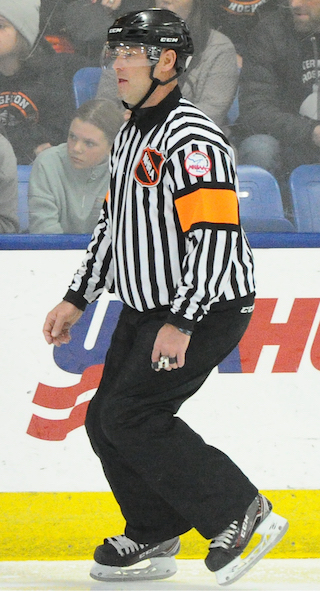 Their games lined up on just a few occasions in the NHL, and the two lobbied hard to have McCauley work Smolinski’s 1,000th career game in his final season with the Canadiens in 2007-08. The request, sadly, was denied by the league.
Their games lined up on just a few occasions in the NHL, and the two lobbied hard to have McCauley work Smolinski’s 1,000th career game in his final season with the Canadiens in 2007-08. The request, sadly, was denied by the league.
On the rare occasions when the friends did share the same ice, less than a handful by Smolinski’s count, it was McCauley who was forced to rebuff any attempts at fraternization. It’s just part of an official’s edict.
“For both of us, it was amazing; it was just great,” Smolinski said. “I’d say, ‘Hey man what’s up?’ and he says, ‘Can’t talk.’ I’m like, ‘What do you mean, we talk all the time.’ Again, he’s like, ‘Can’t talk, get away from me.’ You know, it was just business.”
McCauley then reached the 1,000-game plateau himself in 2018 and is still going strong as a regular selection for playoff duties with nine Stanley Cup Finals assignments, including last year.
So, it should have been natural for Smolinski to go to his old friend immediately for officiating pointers once he joined the ranks, right? Well, maybe not immediately.
“I talk to Wes all the time, but I actually hid it from him right out of the gate because I didn’t want to take his razzing. Eventually it got out, and he was loving it. He started sending me whistles and visors and pants,” Smolinski said, grinning. “And none of it fit, you know, because I’m older and fatter, and he’s so damn skinny. So, I still had to go out and get all new gear.”
Both Sides Now
Having been to the top of his profession, now moving to the other side of that same mountain that his friend McCauley scaled, the respect has grown for those blowing the whistle.
“The preparation for officiating is much more mental,” Smolinski said. “Way more rules oriented. You’re always trying to get away with things that you can as a player; now you have to police that.”
Smolinski has a distinct advantage.
“I know everything they’re trying to do because I’ve done it. I know where you’re going with the puck, I know what kind of breakout you’re trying to do,” Smolinski said. “I have all the instincts, now I just try to stay out of the way and not ruin their game. The most fun is watching the game develop and the ups and downs. For me to be out there and enjoy it with them, that’s the fun part.”
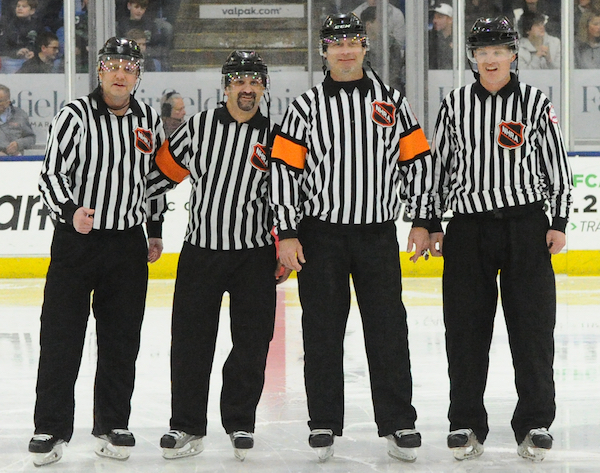 Those who have played hockey at any level have a built-in advantage should they consider the officiating avocation: the ability to skate. Unlike officiating in any other sport, skating is a prerequisite. This makes the pool limited, and almost solely composed of former players. Smolinski offers this advice.
Those who have played hockey at any level have a built-in advantage should they consider the officiating avocation: the ability to skate. Unlike officiating in any other sport, skating is a prerequisite. This makes the pool limited, and almost solely composed of former players. Smolinski offers this advice.
“I prefer sticking with high school because I think there’s more decorum, more administrative structure. Kids are playing for their schools, there’s loyalty there,” said Smolinski. “And there is more accountability. People need report to athletic directors and supervisors. Other levels can be more loosely governed, or a bit more maverick in nature. Moms and dads get involved more, coaches maybe know a little less,” said Smolinski.
He has, in fact, worked a handful of non-school games, and there’s a stark difference.
“I wanted to see what was going on, and I see it first-hand,” Smolinski said. “There are some crazy people and parents out there, and these guys are getting absolutely tortured. I’ve been tortured. There has to be a level of respect for what officials do. I think schools can rein that in a little more. All the guys I’ve met give up a lot of time and work hard because they love to do it and love the game.”
All sports need an assist from school administration and from those who once played the games to keep the officials recruitment moving in the right direction. People like Smolinski can help.
“He clearly doesn’t need to do this, and that’s what makes it so fantastic,” DiCristofaro said. “We need more people who have played – at any level – to do what he’s done and stay in the game as officials.”
Smolinski continues to promote the game in other ways as well. Currently, he is involved in the NHL’s Learn To Play initiative, which aims to inspire youth and welcome more families into the hockey community.
“We work hand-in-hand with the NHL Players Association for player development and industry growth,” Smolinski said. “Ages 5 to 9 are introduced to hockey, get head-to-toe gear and instruction, and meet some former players.”
The idea is to have fun first, which can translate into years and maybe even a lifetime in the sport. It’s a lifetime that has given Smolinski so much and continues to do so as he watches it unfold for others from his new vantage point.
PHOTOS (Top) MHSAA official Bryan Smolinski signals during Friday's Division 1 Semifinal between Brighton and Hartland. (2) Smolinski, a retired NHL standout, communicates with the Bulldogs' bench. (3) Smolinski keeps watch during game play. (4) Smolinski, third from left, with his crew: Michael Andrews, Kevin May and Thomas Robbins.

